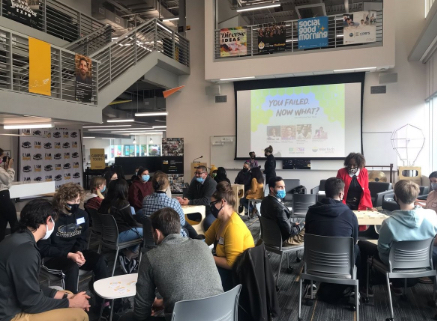Editor’s note: This story appears via This Week in Milwaukee Rising, a weekly newsletter from Technical.ly that highlights the innovators bringing a more just, equitable and dynamic Milwaukee economy. Subscribe here to follow civic-minded news in the Rust Belt city.
Kathy Henrich is ready for Milwaukee’s tech community to step out of the shadows.
As CEO of Milwaukee Tech Hub Coalition, she is charged with fostering connections to help grow the city’s technology ecosystem. But she says it’s less about capturing a slice of Silicon Valley and more about uncovering the potential that’s already here.
“I’m a firm believer that if we’re going to be successful into the next generation, we’re going to have to be on the forefront of technology,” Henrich told Technical.ly. “How do you grow a startup ecosystem that is inclusive of everyone, breaks down barriers and has the welcoming Wisconsin flair no matter where you are in the startup journey? We’re trying to create enduring prosperity and sustainable jobs. I think then people can start to see a different future from an economic perspective.”
Henrich, a former longtime sales director for IBM, says collaboration is key to establishing Milwaukee’s presence as an emerging tech hub. That’s nowhere more evident than at the Milwaukee Tech Hub.

Since launching in 2019, the coalition has grown from six founding members to more than 75 entities that include corporate, nonprofit, education and community organizers who work together to extend their collective impact. Underlying the partnerships is a commitment to diversity and inclusion, and to promoting the surrounding community. Together the group provides various programs, from upskilling and tech apprenticeships and K-12 learning, to talent accelerators and its startup incubator initiative, FOR-M.
The primary goal? To “inclusively double” tech talent across the region.
“We have a really strong base for tech talent to build off, but it’s hidden because it’s embedded in traditional industries,” said Henrich, adding that Milwaukee has nearly 72,000 tech employees who represent roughly 8.5% of the region’s total workforce. “Yet, we still see ourselves as a city that has insurance or manufacturing. If we’re able to get people to believe in a mission greater than their organizations, we can get them to agree we are collectively stronger together.”

With much of its technology advancements embedded in traditional industries such as manufacturing, Milwaukee hasn’t received the same level of attention or capital as other emerging tech hubs. The city has received far less venture capital than cities of comparable size, per the latest PitchBook-National Venture Capital Association Venture Monitor, with $32 million invested across eight deals; compare that to Baltimore, which captured more than $75 million across 13 deals.
That reputation is slowly changing, as tech startups gain steam here and organizations large and small collaborate to build out a strong talent pipeline, Henrich said. The StartupBlink 2021 report ranked Milwaukee as the 173rd-best cities for startups in the world, and #51 in the US, and while the number presented a drop in a pandemic-challenged year, the CEO thinks efforts to enrich personal connections can help usher in the evolving economy.
And at Milwaukee Tech Hub, connections are considered a success metric.
This fall, the organization celebrated its first year at the helm of Milwaukee Tech Week, which attracted more than 1,800 participants who attended more than 50 events put on by 45 partners. Henrich estimates that outside of the event, the organization has helped to facilitate more than 320 connections across the ecosystem, from fundraising and product development to first customers.
“When I look at our startup ecosystem, it is young,” she said. “But I do think we have a growing set of founders that could lead to really great success later on. We have an evolving ecosystem and there is a ton of promise. You can point to promise in the number of founders we’re seeing, the number of new venture funds that have closed and coming on the scene, and you can count the growth of the VC invested in the region. Holistically, we see momentum, even if we’re not at the top place.”

For Henrich, she remains motivated by making an impact. From her humble upbringing in Iowa to leading technology teams for an international tech giant, the CEO says she has finally found the role to create lasting change.
“Part of it is getting people to buy into a vision,” she said. “We are just two years into our journey. We’re not there yet. But we have all the makings of a championship city.”
As the region looks to transform its Rust Belt image and embrace the future of innovation, the tech scene must move beyond being a grassroots initiative and gain widespread support, Henrich says.
“Startups and small businesses are the driver of the majority of our economy so this is critically important to our future,” Henrich says. “When you looked at our ecosystem [before] there wasn’t a big enough funnel. People want to come to vibrant ecosystems where there are opportunities to collaborate. This is an opportunity to come together.”
Subscribe to This Week in Milwaukee Rising:







